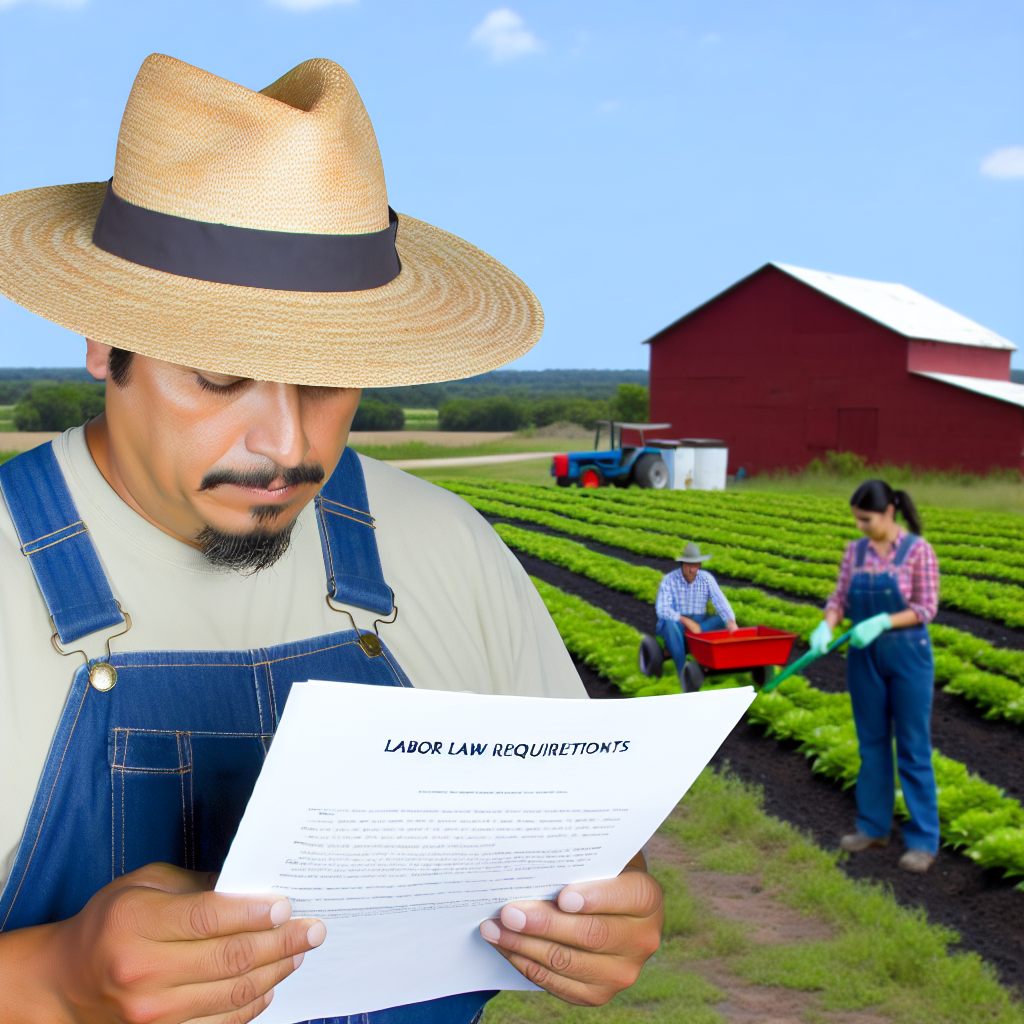Overview of Labor Laws Relevant to Agricultural Sector
Labor laws significantly impact the agricultural sector.
These laws protect workers’ rights and ensure fair treatment.
Understanding these laws helps farmers maintain compliance.
Fair Labor Standards Act
The Fair Labor Standards Act establishes minimum wage requirements.
This law mandates overtime pay for suitable agricultural workers.
Employers must keep accurate time and wage records.
Moreover, it restricts child labor in various agricultural environments.
Occupational Safety and Health Administration
The Occupational Safety and Health Administration ensures safe working conditions.
This agency sets safety standards tailored to agricultural activities.
Farmers must provide proper training and safety equipment to workers.
Regular safety inspections help maintain compliance.
Family and Medical Leave Act
The Family and Medical Leave Act provides eligible workers with unpaid leave.
This law covers family emergencies and medical conditions.
Farm workers should understand their rights under this law.
Farm owners must ensure proper documentation and management of leaves.
Transform Your Agribusiness
Unlock your farm's potential with expert advice tailored to your needs. Get actionable steps that drive real results.
Get StartedImmigration and Nationality Act
The Immigration and Nationality Act governs employment eligibility.
It requires employers to verify workers’ immigration status.
Farm owners must comply with work authorization regulations.
Failure to do so can lead to serious penalties.
State-Specific Labor Laws
Each state has its own labor laws affecting agriculture.
Farmers must be aware of local regulations regarding wages and hours.
Some states may impose additional safety standards.
Consulting local experts is important for compliance.
Employment Agreements and Contracts
Clear employment agreements establish expectations for both parties.
These contracts should outline job responsibilities and pay rates.
Additionally, they should address termination policies and dispute resolution.
Well-drafted contracts protect both employers and employees.
Understanding the Fair Labor Standards Act (FLSA) for Farms
Overview of FLSA
The Fair Labor Standards Act sets essential labor standards for various industries.
This includes many agricultural workers and farms across the country.
The FLSA establishes minimum wage, overtime pay, and youth employment regulations.
Understanding these provisions is crucial for farm owners and managers.
Minimum Wage Requirements
All farms must pay their employees at least the federal minimum wage.
Exceptions exist for certain types of workers, like seasonal and recreational employees.
Farm owners should regularly review wage rates to ensure compliance.
State laws may require higher minimum wages than federal standards.
Overtime Pay Regulations
Employees who work over 40 hours in a week are entitled to overtime pay.
This pay must be at least one and a half times their regular rate.
Some farm workers may be exempt from overtime under specific conditions.
It is important for employers to assess which workers qualify as exempt.
Showcase Your Farming Business
Publish your professional farming services profile on our blog for a one-time fee of $200 and reach a dedicated audience of farmers and agribusiness owners.
Publish Your ProfileYouth Employment Rules
The FLSA has specific guidelines for employing minors on farms.
Workers under 16 cannot perform hazardous tasks, such as operating heavy machinery.
However, youth may work in non-hazardous roles, given parental consent.
Employers should keep thorough records of the age and work conditions for younger employees.
Recordkeeping Requirements
Farms must maintain accurate records of each employee’s hours worked and wages paid.
Good recordkeeping helps ensure compliance with FLSA requirements.
Records should include the employee’s name, occupation, and rate of pay.
Retention of payroll records for at least three years is necessary.
Workers’ Rights Under FLSA
Employees have the right to file complaints if they believe labor laws are violated.
Employers cannot retaliate against employees who assert their rights.
Understanding these rights is vital for both employers and employees in the agricultural sector.
Consequences of Non-Compliance
Failure to adhere to FLSA regulations can lead to significant repercussions.
Farms may face fines and legal actions for violations of labor laws.
Employers should prioritize compliance to protect their business and workforce.
Training and education on labor laws can help prevent unintentional infractions.
Minimum Wage Requirements and Exceptions for Agricultural Workers
Overview of Minimum Wage Laws
Minimum wage laws establish the lowest compensation that workers can receive.
These laws vary by state and sometimes by specific industries.
Agricultural workers are often subject to unique regulations under these laws.
Understanding these nuances is essential for both employers and employees.
Federal Minimum Wage Standards
The Fair Labor Standards Act (FLSA) sets minimum wage standards across the United States.
As of 2023, the federal minimum wage is $7.25 per hour.
However, many states have enacted higher minimum wage rates.
Employers must pay at least the higher of the federal or state minimum wage.
State-Specific Requirements
Each state can determine its minimum wage standards.
Some states have special provisions for agricultural workers.
It’s crucial for farm owners to check their state laws regularly.
Noncompliance can lead to significant legal and financial repercussions.
Exceptions for Agricultural Workers
Not all agricultural workers are entitled to the same wage protections.
Certain exceptions exist, particularly for small farms.
For instance, farms with fewer than seven workers may be exempt under some state laws.
Additionally, some migrant and seasonal workers may have different pay regulations.
Importance of Accurate Record Keeping
Employers must maintain accurate records of hours worked and wages paid.
Documentation is essential for compliance with wage laws.
Failure to keep proper records can result in penalties.
Employers should use reliable systems to track worker hours effectively.
Resources for Employers
Numerous resources exist to help farmers understand labor laws.
The U.S. Department of Labor provides guidelines on agricultural wage requirements.
State labor departments also offer valuable information and assistance.
Consulting with legal counsel can provide clarity on specific situations.
Explore Further: Key Requirements For Organic Certification
Showcase Your Farming Business
Publish your professional farming services profile on our blog for a one-time fee of $200 and reach a dedicated audience of farmers and agribusiness owners.
Publish Your ProfileOvertime Pay Regulations and their Application to Farm Employees
Overview of Overtime Pay Regulations
Overtime pay regulations help protect farm workers’ rights.
These laws ensure fair compensation for extra work hours.
In the United States, the Fair Labor Standards Act (FLSA) governs overtime pay.
This act generally requires employers to pay overtime for hours beyond 40 in a week.
However, exemptions exist specifically for agriculture workers.
Federal Exemptions Under FLSA
The FLSA has specific exemptions relevant to farm operations.
For instance, small farms may not be required to pay overtime under certain conditions.
Farms that employ fewer than 500 man-days of agricultural labor are exempt.
This exemption does not apply if the farm engages in processing or marketing activities.
Employers should verify their eligibility for these exemptions.
State-Specific Overtime Regulations
Many states have their own labor laws regarding overtime pay.
These laws can vary significantly from federal regulations.
In some states, all agricultural workers qualify for overtime pay.
It is essential for farm employers to understand both federal and state laws.
Consultation with legal experts can help clarify these requirements.
Calculating Overtime Pay for Farm Workers
Employers must understand how to calculate overtime correctly.
Overtime pay typically equals 1.5 times the employee’s regular rate.
This rate applies to hours worked over 40 within a workweek.
Employers must keep detailed records of hours worked by employees.
Accurate payroll practices ensure compliance with labor laws.
Best Practices for Compliance
Farm operators should implement effective payroll systems.
Always track employee hours meticulously to avoid disputes.
Regular training on labor laws for management can reinforce compliance.
Establish clear communication with employees about pay practices.
This can help prevent misunderstandings regarding overtime pay.
Learn More: Steps To Achieve Organic Certification
Safety and Health Regulations under OSHA for Agricultural Operations
Understanding OSHA Standards
The Occupational Safety and Health Administration (OSHA) sets standards for farm safety.
These regulations help protect farm workers from hazards.
Compliance is essential to ensure a safe work environment.
Farm operators must understand which OSHA standards apply to them.
Importance of Training and Education
Training is vital for promoting safety on farms.
Farmers should educate their workers about potential hazards.
OSHA requires training for certain activities and equipment usage.
Regular refresher courses can enhance safety awareness.
Recognizing Common Hazards
Farms face various safety risks daily.
Common hazards include machinery, chemicals, and animal handling.
Employers must assess risks regularly.
Identifying hazards is the first step toward prevention.
Machinery and Equipment Safety
Machinery can pose significant safety risks on farms.
Operators should use equipment correctly to prevent accidents.
Showcase Your Farming Business
Publish your professional farming services profile on our blog for a one-time fee of $200 and reach a dedicated audience of farmers and agribusiness owners.
Publish Your ProfileRegular maintenance is necessary for safe operation.
Farmers must train employees on proper machinery usage.
Chemical Safety
Farm chemicals can be hazardous if mismanaged.
Workers must know how to handle fertilizers and pesticides safely.
Providing personal protective equipment is crucial.
OSHA requires proper labeling and storage of chemicals.
Animal Handling Safety
Working with animals presents unique risks.
Workers should learn safe handling techniques.
Proper facilities can minimize accidents during animal interactions.
Training helps workers recognize animal behaviors that may lead to injury.
Recordkeeping and Reporting Requirements
OSHA mandates specific recordkeeping for workplace injuries.
Farm employers must maintain accurate records of incidents.
Reports help identify patterns and improve safety measures.
Transparency in reporting fosters a culture of safety.
Protecting Young Workers
Younger workers face unique risks in agricultural settings.
Employers must ensure that young workers receive appropriate training.
Tasks should match their skill levels to prevent injuries.
Involving parents or guardians in the conversation can enhance safety.
Learn More: Renewal Guidelines For Organic Certification
Employee Classification: Independent Contractors vs. Employees on Farms
Understanding Employee Classification
Employee classification affects labor law requirements significantly.
Misclassification can lead to legal and financial consequences.
Farm owners must understand the differences between the two categories.
Defining Employees
Employees are individuals hired to work for a business consistently.
They receive regular wages or salaries for their efforts.
Additionally, employers control their work processes and schedules.
Employees also typically receive benefits, such as health insurance.
What are Independent Contractors?
Independent contractors operate their own businesses.
They work on a contract basis, providing services to clients.
Importantly, independent contractors have more control over their work.
They determine how and when to complete tasks, with less oversight.
Key Differences in Responsibilities
Farm owners hold more responsibilities for employees than contractors.
For employees, farms must withhold taxes, Social Security, and Medicare taxes.
Contractors are responsible for their own tax obligations.
Moreover, farms typically need to provide safety equipment for employees.
Legal Implications of Misclassification
Misclassifying an employee as a contractor may trigger audits.
Farms could face penalties and back tax payments from authorities.
Additionally, employees may file claims for unpaid benefits.
This includes unemployment insurance and workers’ compensation.
Factors for Proper Classification
The IRS provides guidelines to help classify workers correctly.
They consider behavioral control, financial control, and relationship types.
Showcase Your Farming Business
Publish your professional farming services profile on our blog for a one-time fee of $200 and reach a dedicated audience of farmers and agribusiness owners.
Publish Your Profile- Behavioral control looks at the degree of oversight.
- Financial control assesses how workers are paid and reimbursed.
- Relationship type evaluates contracts, benefits, and permanence.
Common Mistakes to Avoid
One common mistake is relying solely on job titles for classification.
A job title does not determine a worker’s status under the law.
Farm owners should evaluate the dynamics of the worker relationship.
Another mistake is assuming that all seasonal workers are independent contractors.
Best Practices for Compliance
Consult with legal experts to ensure proper classification.
Regularly review your workforce to identify classification issues.
Utilize clear contracts that define the nature of the working relationship.
Provide training for HR staff regarding classification standards.
Gain More Insights: Understanding Agricultural Land Use Restrictions

Family and Medical Leave Act (FMLA) Provisions Impacting Farm Workers
Overview of FMLA
The Family and Medical Leave Act provides crucial protections for workers.
Farm workers can benefit from these provisions under certain circumstances.
It allows eligible employees to take unpaid leave for family and medical reasons.
This law applies to farms that meet specific employee thresholds.
Eligibility Criteria for Farm Workers
To qualify for FMLA, employees must meet certain criteria.
First, they must work for a covered employer.
A covered employer employs 50 or more employees within a 75-mile radius.
Additionally, the employee must have worked for at least 1,250 hours over the past 12 months.
Finally, they must work at a location where the employer has at least 50 employees.
Leave Entitlements
Eligible farm workers can take up to 12 weeks of leave in a year.
This leave can be taken for serious health conditions, childbirth, or adoption.
It is essential that the leave is taken for a qualifying reason.
Furthermore, employees must provide proper notice to their employer.
Job Protection and Benefits
FMLA ensures that employees can return to their same position after leave.
Employers cannot retaliate against employees for taking leave.
During the leave, health insurance benefits must remain unchanged.
This guarantees that workers do not lose essential benefits during their absence.
FMLA’s Impact on Farm Operations
Farm operations can face challenges due to employee absenteeism.
Proper planning is essential to manage labor needs effectively.
Employers should communicate leave policies clearly with employees.
Training other employees to cover roles can help mitigate disruptions.
Understanding FMLA Provisions for Farm Workers
Understanding FMLA provisions is critical for both employees and employers.
Farm workers must know their rights under this important legislation.
Employers should implement supportive policies to comply with FMLA.
Immigration Law Considerations for Hiring Foreign Agricultural Workers
Understanding Visa Requirements
Employers must understand visa options for foreign workers.
The H-2A visa allows agricultural workers to enter the U.S. temporarily.
Farmers should ensure compliance with application timelines.
Additionally, they must provide specific documentation to support visa requests.
Navigating Recruitment Obligations
Employers must demonstrate efforts to recruit U.S. workers first.
This involves advertising job openings in relevant local areas.
They should also maintain records of recruitment efforts for compliance purposes.
Showcase Your Farming Business
Publish your professional farming services profile on our blog for a one-time fee of $200 and reach a dedicated audience of farmers and agribusiness owners.
Publish Your ProfileCompensation Requirements
Employers must pay workers at least the Adverse Effect Wage Rate.
This rate may vary by state and is subject to federal regulations.
Furthermore, employers must provide adequate housing for seasonal workers.
Compliance with Employment Laws
Employers must adhere to labor laws protecting agricultural workers.
These include regulations regarding working conditions and hours.
Employers must also ensure proper safety measures in the workplace.
Record Keeping and Reporting
Maintaining accurate records is essential for compliance.
Employers should document all hiring practices and worker information.
This includes time sheets, wage payments, and housing arrangements.
Regular audits can help identify any compliance issues early on.
Recordkeeping and Reporting Requirements for Farm Employers
Importance of Recordkeeping
Accurate recordkeeping is essential for farm employers.
It helps ensure compliance with labor laws.
Proper records can protect farms during audits.
Furthermore, they assist in tracking employee hours and wages.
Required Records
Farm employers must maintain specific records.
These include employee payroll records.
Also, keep timecards or time sheets for each worker.
Employers should record overtime hours as well.
In addition, maintain records of employment contracts.
Track employee benefits and health insurance documents.
Record Retention Guidelines
Employers must adhere to record retention guidelines.
Generally, retain payroll records for at least three years.
Keep employee records for a minimum of five years.
Store records in a secure and accessible location.
Review and update records regularly to ensure accuracy.
Reporting Obligations
Farm employers have various reporting obligations.
They must report employee earnings to tax authorities.
Additionally, file required state and federal payroll taxes.
Employers are required to submit workers’ compensation reports.
ADA compliance and safety reports may also be necessary.
Impact of Non-Compliance
Non-compliance can lead to serious consequences.
Penalties may include fines and legal action.
Such consequences can harm a farm’s reputation and finances.
Moreover, employers may lose access to government programs.
Best Practices for Compliance
Implementing best practices can simplify compliance.
Training staff on recordkeeping is crucial.
Utilize software for efficient time tracking and payroll.
Regularly review policies to stay updated on changes.
Consult with legal experts for specific regulations.
State-Specific Labor Laws Impacting Farming Operations
Understanding Labor Laws in Agriculture
Labor laws can vary significantly by state.
Showcase Your Farming Business
Publish your professional farming services profile on our blog for a one-time fee of $200 and reach a dedicated audience of farmers and agribusiness owners.
Publish Your ProfileEach state has unique regulations affecting farming operations.
Farm owners must understand these laws to remain compliant.
Wage and Hour Laws
Most states have minimum wage laws that apply to farms.
Farmers must pay at least the state minimum wage.
Additionally, some states require overtime pay for farm workers.
It is crucial to track hours worked to ensure compliance.
Child Labor Regulations
Many states have strict regulations regarding child labor on farms.
Farm owners must know the minimum age for farm work.
They must also be aware of the hours children are permitted to work.
Understanding these rules can prevent costly fines.
Health and Safety Guidelines
Safety regulations are vital for protecting farm workers.
States may enforce their own safety standards on farms.
Farmers must provide proper training and equipment for their workers.
Regular safety inspections can help maintain compliance.
Worker’s Compensation Requirements
Worker’s compensation laws protect employees injured on the job.
Most states require farms to carry worker’s compensation insurance.
This insurance helps cover medical expenses and lost wages for injured workers.
Union and Collective Bargaining Rights
Farmworkers may have the right to form unions in some states.
Understanding collective bargaining rights is important for farm owners.
Legal counsel can help navigate union-related issues effectively.
Environmental Regulations and Labor
Many states tie agricultural labor practices to environmental regulations.
Compliance with these rules can impact labor requirements and practices.
Farmers should stay informed about environmental laws impacting labor activities.
State-Specific Resources
Resources are available to help farmers understand state laws.
Many agricultural associations offer guidance on labor regulations.
Farmers can benefit from consulting local agricultural departments.




